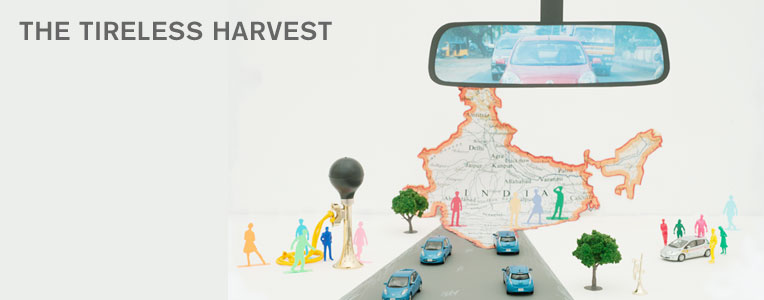The Tireless Harvest

India is a land of many things, not least of all, first-time car buyers. This is a challenge only for the most determined: How to give these customers complete satisfaction?
For the manufacturer’s staff, there are still lessons to be learned and improvements to be made even after a car has been sold. And the teachers are none other than the new drivers themselves. Like harvesting a crop, every day, every month, every year Nissan is passionately listening to its customers’ voices and seeking ways to answer their needs in each region. Just one of these is the vast and varied land of India.
The constant harvesting of customers’ voices
Nissan India's Total Customer Satisfaction (TCS) department works assiduously together with the R&D and Planning and Manufacturing teams to deliver long-term improved car quality and target the causes of customer complaints. They are especially interested in the so-called Voice of the Customer (VOC), the opinions of drivers.
Regular survey techniques, such as phone surveys and online questionnaires, are not adequate enough for these rigorous engineers. Ever keen to get to the heart of the matter, the survey team drives around with the customers in their actual vehicles, interviewing them and listening to their problems.
How are the drivers using their car? What are they doing? The TCS surveyors need to check this as they listen, since a market like India with many first-time buyers drivers will often have special requests and complaints that regular survey and research means never reveal. They go diligently from north to south, looking at how both urban and rural customers all over India are driving their vehicles. And reaping the harvest of this unique know-how they can then begin creating solutions to reflect drivers' needs.

Staff from Nissan's Total Customer Satisfaction (TCS) department conduct interviews with car owners at dealerships all over India. These "bespoke tailors" are passionate about speaking to drivers after they have purchased their vehicles.
Listening to "noisy" complaints
Atul Aggarwal is one member of the survey team who worked on adapting car horns as a result of the bespoke interviews. Indian cities and roads are narrow, and prone to chronic traffic congestion. The car horn is a vital tool for inter-driver communication on a daily basis. But the high frequency of horn use specific to India demands particular attention to the design if drivers are going to be fully satisfied with their vehicles.
The survey team heard direct requests from customers in their interview sessions and horn louder they doubled the number of horn sounds, and even reduced the spring strength of the horn itself so that it would be easier to press when driving.
In this way, not only do the customers' hopefully get what they want, it also means the work is more rewarding for the engineers too, since they know they are directly responding to drivers' wishes. Driving in the car with the owners they learn that, for example, they want more space for their feet so their knees do not bang against the car. Actual field interviews are the best way for the team to learn the emotions of the owners and what they really want – and then to work hard to find a way to provide for this.

Sometimes the team will even conduct interviews with owners in their actual cars. This kind of surveying technique gets closer to the daily lives of drivers, meaning they can harvest diverse insights normally unreported.
A crop from every region
It’s not only in India that the survey team is beavering away. There are teams conducting various kinds of customer satisfaction surveys in regions all over the world, listening daily to feedback from local drivers to enhance the quality Nissan delivers for each market. At the core of this in-depth practice is one idea: Cars that connect intimately with people's lifestyles need to be firmly rooted in the cultures and customs of every area.
The TCS teams are painstaking in their quest to achieve this idea, which they can only do by listening to drivers in all regions. The crop yielded from the Voice of the Customers is not an annual harvest. It is year-round, never-ending, and yet, if you are tireless enough, abundant in its return.

